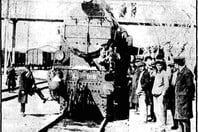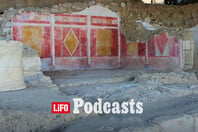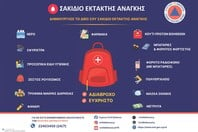"Σήμερα μάθαμε ότι (...) οι αρχαίοι Μακεδόνες δεν ήταν ακριβώς Έλληνες. Μάλιστα". Χωρίς να υπάρχει καμία αμφισβήτηση ως προς την μεταγενέστερη "ελληνοποίηση" των αρχαίων Μακεδόνων (γλωσσικά, πολιτισμικά κ.λπ.). Η ακριβής καταγωγή τους αποτελεί, πράγματι, κομμάτι διερεύνησης. "The cultural links of prehistoric Macedonia were mainly with Greece and Anatolia. A people who called themselves Macedonians are known from about 700 bce, when they pushed eastward from their home on the Haliacmon (Aliakmon) River under the leadership of King Perdiccas I and his successors. The origin and identity of this people are much debated and are at the centre of a heated modern dispute between those who argue that this people should be considered ethnically Greek and those who argue that they were not Greek or that their origin and identity cannot be determined (see Researcher’s Note: Macedonia: a contested name). This dispute hinges in part on the question of whether this people spoke a form of Greek before the 5th century bce; it is known, however, that by the 5th century bce the Macedonian elite had adopted a form of ancient Greek and had also forged a unified kingdom. Athenian control of the coastal regions forced Macedonian rulers to concentrate on bringing the uplands and plains of Macedonia under their sway—a task finally achieved by their king Amyntas III (reigned c. 393–370/369 bce)".https://www.britannica.com/place/Macedonia-ancient-kingdom-Europe"Ancient Macedonian, the language of the ancient Macedonians, either a dialect of Ancient Greek or a separate language closely related to Greek, was spoken in the kingdom of Macedonia during the 1st millennium BC and belongs to the Indo-European language family. It gradually fell out of use during the 4th century BC, marginalized by the use of Attic Greek by the Macedonian aristocracy, the Ancient Greek dialect that became the basis of Koine Greek, the lingua franca of the Hellenistic period".δείτε και το Classificationhttps://en.wikipedia.org/wiki/Ancient_Macedonian_language«Ο Αλέξανδρος (ο Α’)θέλησε να πάρει μέρος σ’ αυτούς (τους Ολυμπιακούς αγώνες) και γι’ αυτό το σκοπό είχε έρθει στην Ολυμπία. Οι Έλληνες όμως οι οποίοι επρόκειτο να συναγωνισθούν μαζί του εναντιώθηκαν, λέγοντας ότι ο αγώνας δεν είναι για βαρβάρους αλλά για Έλληνες. Ο Αλέξανδρος όμως αφού απέδειξε ότι είναι Αργείος, θεωρήθηκε Έλληνας και έτσι συμπεριελήφθη στο αγώνισμα δρόμου του ενός σταδίου και μάλιστα (στέφθηκε Ολυμπιονίκης), φθάνοντας στο τέρμα ταυτόχρονα με τον πρώτο δρομέα». (Ένα στάδιο = 184,87 μ.).και μία ενδιαφέρουσα συζήτηση (τριάντα και) σελίδων κάτωθι, ειδικά τα στοιχεία που αφιδώς προσφέρει ο "skam":https://www.forums.gr/forum/επιστήμες/ιστορία-αρχαιολογία/34344-η-αρχαία-μακεδονία-ήταν-έλληνες-ή-μακεδόνες
























